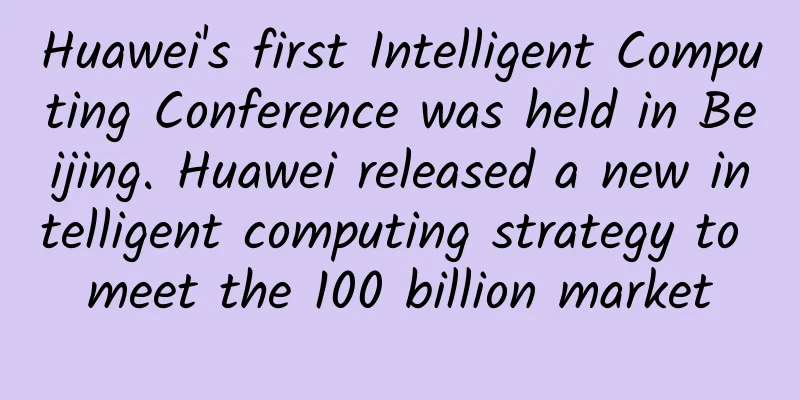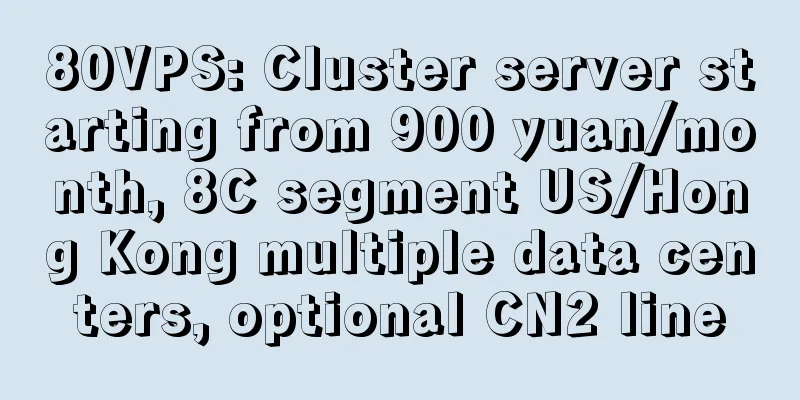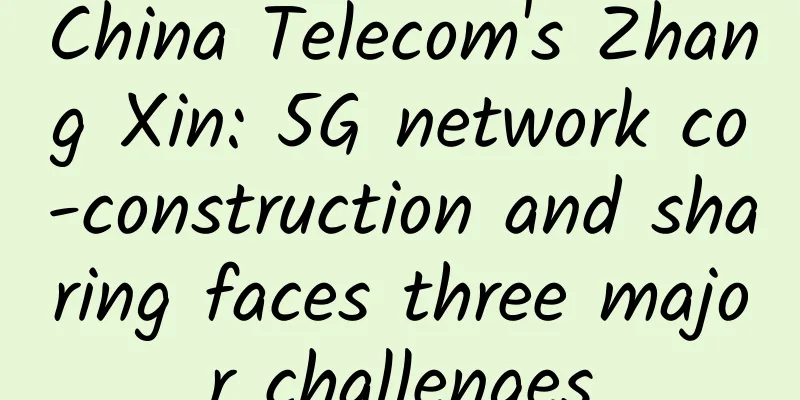Huawei's first Intelligent Computing Conference was held in Beijing. Huawei released a new intelligent computing strategy to meet the 100 billion market

|
[51CTO.com original article] On December 21, 2018, Huawei held the first Huawei Intelligent Computing Conference in Beijing with the theme of "Starting with the Chip, Making Intelligent Computing Pervasive". At the conference, Huawei grandly released its China Intelligent Computing business strategy, announcing that Huawei Intelligent Computing will focus on computing power, engineering, cloud-edge collaboration, and integrated solutions to build full-stack, full-scenario intelligent solutions for the industry, accelerate the industry's intelligent process, and enable the industry's intelligent reconstruction.
Huawei establishes Intelligent Computing Business Unit to create the core driving force of the Fourth Industrial Revolution Hou Jinlong, president of Huawei's IT product line, said that Huawei regards intelligent computing as the core driving force of the Fourth Industrial Revolution. "We believe that intelligent computing has two meanings." Hou Jinlong said that the first layer is to build an intelligent computing platform with a unified architecture, and through sufficient computing power and rich computing forms, to achieve computing power deployment in all scenarios of cloud, edge and end, support the application of artificial intelligence, enable the transformation of industry intelligence and the reconstruction of production, and improve production efficiency. The second layer is to apply artificial intelligence technology to infrastructure to achieve intelligent upgrades, which can improve the computing efficiency and operation and maintenance costs of the computing center and reduce the cost of the entire pipeline end in bits. So how to achieve intelligent computing? Huawei has also thought about it very clearly. Hou Jinlong believes that on the one hand, intelligent acceleration can be achieved through chips to achieve efficient improvement of existing computing power. For example, Huawei will use accelerated components to improve the system and reduce the unit computing power cost. At the same time, intelligent management is also needed to achieve efficient management of the entire data center of the server. On the other hand, for AI applications, through AI-specific chips, based on Huawei's many years of engineering capabilities, network capabilities, system architecture and management capabilities, sufficient computing power is provided for AI in all scenarios to drive the continuous progress and development of the computing industry. At the end of his speech, he officially announced that in the intelligent era, Huawei's server department, as an infrastructure service department for digital and intelligent transformation, will keep pace with the times and be officially upgraded to Huawei's Intelligent Computing Business Department. Qiu Long, president of Huawei's Intelligent Computing Business Unit, added that after Huawei's server department was upgraded to the Intelligent Computing Business Unit, two major changes occurred: the first change was at the market level, Huawei established a global sales and service organization dedicated to intelligent computing to help customers achieve intelligence; the second change was the establishment of a relatively independent organization within R&D to make internal resource investment more focused, while procurement, supply chain, and manufacturing were relatively optimized and adjusted specifically for the intelligent computing business. Huawei continues to deepen its "technology + ecosystem" strategy to meet the 100 billion yuan market of intelligent computing At the Huawei Intelligent Computing Conference, Lu Yong, President of Huawei China, emphasized that Huawei will work with customers and partners to create a dual-driven business model of "technology + ecology" in the future to meet the future intelligent computing industry scale of hundreds of billions. He pointed out that the release of Huawei's China Intelligent Computing Business Strategy has two main purposes. On the one hand, Huawei hopes to follow the business rules of the intelligent computing industry, improve operational efficiency from end to end, reduce operating costs, and allow customers and partners to share this benefit. On the other hand, it is to show Huawei's confidence in the future development of the intelligent computing industry. Huawei believes that it has formed considerable core competitiveness in the current intelligent computing field. He further stated that Huawei respects the business characteristics of the intelligent computing field and will gradually build e-commerce, telemarketing, and online and offline platforms to achieve coordinated development online and offline. At the same time, it will fully match the industry model in terms of service delivery and supply, optimize the service experience, and create two service platforms, namely, a service platform for high-quality and fast supply and high-quality and fast service. When talking about future development, he said that in 2019, Huawei's Intelligent Computing Business Department will be consistent with the overall channels and frameworks of the enterprise. After the establishment of the Intelligent Computing Business Department, Huawei will further optimize the policies of the Intelligent Computing Channel and increase support and efforts for partners because its own business costs will be further reduced. This will allow ecosystem partners to truly achieve more pay for more work, while guiding partners to continue to increase investment in the intelligent computing business and ARM's new blue ocean field and obtain more returns, ultimately benefiting customers. Full-stack, full-scenario, and fully intelligent solutions to address the four major challenges of AI popularization If Hou Jinlong and Lu Yong mainly talked about intelligent computing from the perspective of strategic development, then Qiu Long, President of Huawei's Intelligent Computing Business Unit, shared his understanding of the intelligent computing market from the perspective of application. He pointed out that although AI was popular all over the world in 2018, except for the Internet and public security fields, the penetration rate of AI in all industries in the world was less than 4%. What is the reason? There are four main challenges: First, the supply of computing power is seriously unbalanced, scarce and expensive; second, many traditional industries have high requirements for deployment scenarios and harsh and changeable environments; third, cloud-edge data cannot be coordinated and interoperable; fourth, the threshold for professional technical requirements is high and there is a shortage of professional talents. How will Huawei resolve these challenges? Qiu Long's answer is also very direct, that is, to provide customers with full-stack, full-scenario, and fully intelligent solutions. In detail, Huawei's intelligent computing is committed to achieving computing power that exceeds customer expectations through chip capabilities; meeting deployment requirements in harsh environments through universal engineering capabilities; achieving data collaboration and interoperability through cloud-edge collaboration and seamless network coverage; and lowering the threshold for the use of artificial intelligence through integrated solutions. The reporter also learned at the scene that Huawei's intelligent computing product family is now very rich: first, the intelligent server, the previous FusionServer is now upgraded to FusionServer Pro, and second, the enterprise intelligent cloud facilities for cloud infrastructure: hyper-converged FusionCube and intelligent cloud desktop FusionAccess. The last one is the full range of commercial artificial intelligence products Atlas, as well as TaiShan servers and MDC for autonomous driving. Huawei AI is a blockbuster Wan Zhi, president of Huawei's China Intelligent Computing Business Unit, told reporters that Huawei's current intelligent computing products already have a lot of practical cases. "Before our products are launched on the market, we have obtained extensive internal applications to support our internal document processing, and then launched them on the market after verification. Therefore, when Huawei is doing AI, we talk less and do more. If we don't do it, we will make a splash." In the new security field, Huawei's co-built business servers and KunLun series servers support the construction of the Fengyun-4 of the National Meteorological Center, with a reliability of 59%. They can ensure 7×24-hour satellite data service and provide more timely protection for disaster prevention, mitigation and relief. At the Guangzhou Local Taxation Bureau, Huawei's critical business servers have improved database performance by more than twice that of the original platform, effectively ensuring business continuity and enabling the tax department's optimized services to benefit and facilitate the people. In the financial industry, Huawei has teamed up with Yidao Boshi to develop an all-in-one recognition machine that can quickly batch recognize card slips, receipts, and documents with an accuracy rate of over 99%. In the transportation industry, Huawei and Shenzhen Airport have joined hands to build the airport of the future, realizing active security, intelligent wing allocation, and intelligent walking lights to provide better services for passengers. Huawei has jointly launched an all-in-one solution to provide customers with a unified card entrance and a comprehensive solution for traffic management and security control. In the retail industry, Huawei and Malong Technology also signed a cooperation agreement this year, combining the strengths of both parties to jointly create a new retail solution enabled by AI for product identification. Huawei also assisted Heilan Home to help the retail industry achieve greater value. In the manufacturing industry, Huawei cooperates with ADB to lead the development of industrial manufacturing, and jointly cooperates in remote real-time payroll and other aspects. Huawei works closely with SAP to meet the needs of large-scale enterprise data center integration and business integration through its elastic, reliable and efficient features. As the theme of the conference "Starting with the chip, making intelligent computing ubiquitous" said, at the conference, Huawei not only introduced Huawei's Ascend 310 and Ascend 910 chips based on the Da Vinci architecture, but also launched Huawei's series of related products based on AI chips, including Atlas 200, 300, 500, 800, and MDC 600. According to Wan Zhi, in 2019, Huawei will continue to launch a full range of chips from Nano to Max to meet the needs of all full-stack and full-scenario applications. Starting from the "chip", Huawei's intelligent computing ambitions are worth looking forward to. [51CTO original article, please indicate the original author and source as 51CTO.com when reprinting on partner sites] |
>>: You must know the five common misconceptions about HTTPS
Recommend
Ministry of Industry and Information Technology: Firmly grasp the historical opportunity of 5G development and accelerate the deployment and application of Internet of Vehicles
On April 1, the fourth plenary meeting of the Int...
Huawei FusionServer RH8100 adds another option to the mission-critical server market
With the transformation from "Made in China&...
How does the TCP connection state change?
TCP is a connection-oriented reliable transmissio...
Sogou's revenue in 2019 reached 8 billion, a record high
On March 9, Sogou released its unaudited financia...
Inventory of URLError and HTTPError exception handling methods
[[390611]] 1. Introduction This article mainly ta...
RackNerd: Los Angeles AMD Ryzen+NVMe series Windows VPS restock starting at $60/year
RackNerd recently restocked the DC02 (MC Data Cen...
Before becoming a "hacker", you must master the "network protocol port"
In the previous article, we gave a detailed descr...
Commercial CDN returns to its original intention: focus on details and maximize distribution efficiency
On October 20, Live Video Stackcon 2017 was held ...
What is the process of DNS domain name resolution?
Interviewer: Please tell me what the process of D...
What exactly are CPU, GPU, TPU, NPU, etc.?
[[373720]] CPU stands for Central Processing Unit...
KhanWebHost: $1/month KVM-2GB/10GB SSD/1TB/Dallas Data Center
Need to practice VPS hosting? You can take a look...
6G Internet of Things: From the Internet of Everything to the Intelligent Internet of Everything, opening up smart life, smart production and smart society
At the 6G Internet of Things Forum of the 4th Chi...
spinservers: 10Gbps bandwidth high-end server starting at $89 per month, Dallas/San Jose data center
spinservers is a business that mainly provides ov...
A Brief Analysis of Web3.0 Technology
Part 01 Web3.0 concepts and features Web3.0 is a ...
Ruijie Cloud Desktop supports Beijing's COVID-19 fight
Imported from abroad, confirmed locally, the sudd...
![[Black Friday] spinservers: $270 off San Jose high-end servers, dual E5-2683 v4, 512G memory, 2*3.83T SSD, 10Gbps bandwidth](/upload/images/67cac499cea2f.webp)








